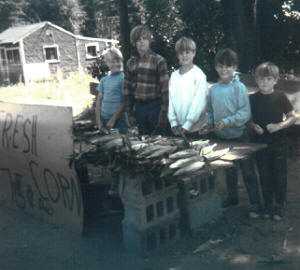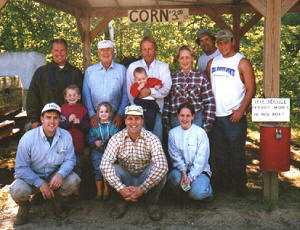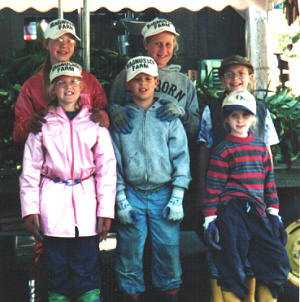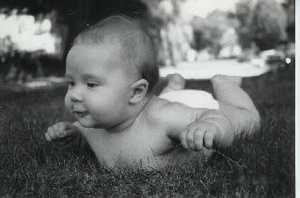A Day in the Life by Gary P. Stevens

It is barely 9:00 on a hot, humid summer morning. The group of children and adults look like they are dressed for combat. Knee-high boots, long sleeve shirts, gloves and heavy-duty jeans. Burlap sacks, fairly bursting with ears of corn, cover the wood planking of a farm wagon. Connie Magnusson walks through the crowd disbursing thank you's.
There are only a handful of family farms left in the area, a far cry from the many that existed in the not-too-distant past. They were institutions built on the backs of hard labor and carried through generations by the extended family, another dinosaur that our children can only read about. But, here in the cornfield, amidst the sharp-leaved corn stalks and swirling mosquitoes, the blood-link thrives. The work is far from easy, but the payoff, and we’re not talking dollars here, is well worth the effort.
An Economist would frown on this practice, predicting an impending financial disaster and loss of jobs. Conrad realizes this and points out that a Socialist would love his business plan. Not really a business plan at all, he confides, just a way to keep the family in touch with each other in a time when time is so scarce.

The wagonload of corn is pulled by tractor to its’ resting spot next to the open-air farm stand that has become Magnusson Farms. What started out as a self-service Christmas tree, sweet corn, sand and gravel side business has blossomed, figuratively and literally into a drive-in market place offering anything from brilliant mums to fresh New England lobster.
The epicenter of the business, on Route 125 in Kingston, is a tiny 12’ by 12’ single story structure, the former home of the "Firefly" restaurant from the late 1940’s. Conrad and his brother Ted used the building as their summer office headquarters for their initial sand and gravel business that began in 1961. That same year they put out their first offerings of the afore-mentioned products. Sand and gravel were held in large bins, Christmas trees propped up against each other, cord wood was bundled tightly in small packages for campers or sold by the cord and half-cord. Sweet corn was sold much the same as it is today, aboard a low flat wagon, with the ever-present metal box, padlocked, with a small slit for the honest consumer to drop his money into.

When folks talk about getting their sweet corn at "that place on 125", they are talking about Magnusson Farm. Families on their way to camps and campsites in the White Mountains invariably pull into Magnusson’s for a couple dozen. Gotta get there early though, as the corn does not usually last too late into the afternoon, as several disappointed drivers can attest to as they drive slowly by, eyeing the "Sold Out" sign.
The family-theme is the catalyst that has converted the small, self-serve stand to the multi-faceted market that exists today. The man behind the mission these days is Conrad’s youngest son, Brian Magnusson. Gifted with a similar vision as his dad, Brian has sent the farm stand growing in all directions, with a greenhouse flanking the small store on one side and a group of out-buildings, holding a varying supply of goods, on the other. A large wooden deck juts out the back of the store to over look a frog pond, the very one that we cousins played hockey on cold January nights.
Inside the store, family members ring up purchases and arrange dried corn stalks. Young cousins work together bagging corn or selling home made cookies. Conrad acknowledges that jobs such as these are few and far between. Brian arranges pumpkins while his little son toddles by, stocky like his dad; he bowls over two pumpkins and howls with delight. Conrad catches Brian’s eye and they both laugh loudly. There it is, right there, Conrad smiles and climbs on his bike, pedaling off towards town.

The Magnusson’s memories are happening right in front of my eyes. The early mornings, muscling through wet rows of corn, checking ears and snapping them off. Shouts of encouragement, and the good-natured teasing that only relatives understand and only relatives would put up with.
Funny, I came here to write about a farm stand and discovered something totally unexpected, a family business where family comes first. Maybe it is that seamless transition that makes it work. Maybe the sweet corn tastes so good because it is not picked by a machine. Or, maybe I will just take home a dozen myself and share it with my family.